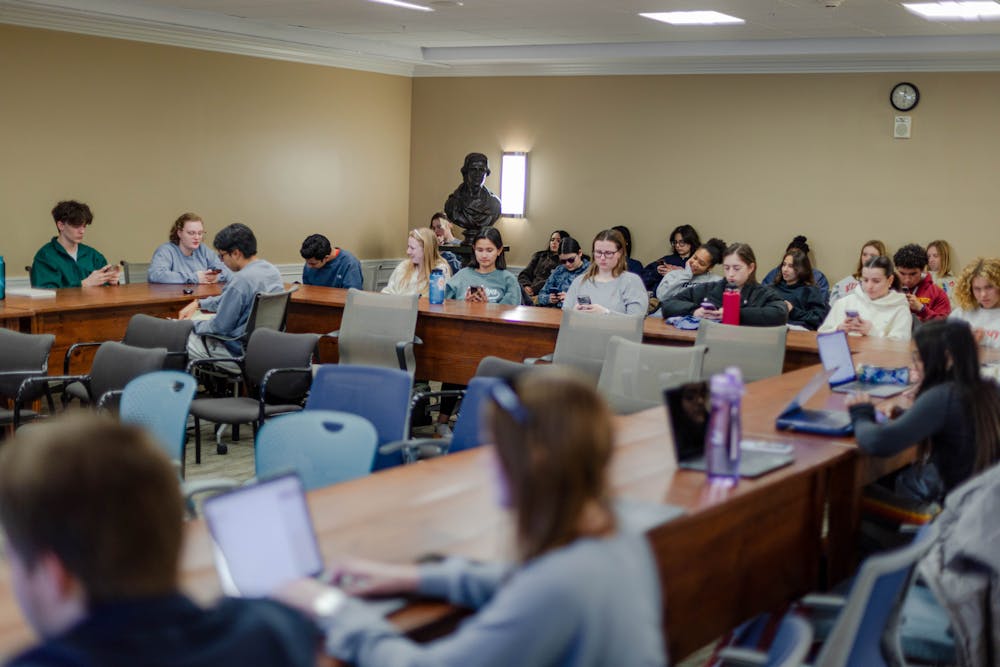The University Judiciary Committee has received four new cases — three against organizations and one against an individual — all violating Standard 2, pertaining to conduct that intentionally threatens a person’s health and safety. This marks a continuation of an unusually high share of these violations, with alleged Standard 2 violations included in a majority of the current pending cases.
Lisa Kopelnik, chair of the UJC and third-year College student, said Standard 2 is a broad violation that can be used alongside others, depending on the conduct. Still, Kopelnik said Standard 2 is a “higher level violation” that continues to become more common.
The proportion of cases that include Standard 2 is up considerably. The UJC processed 12 Standard 2 cases in Fall 2015 — 25.5 percent of all cases. This percentage is lower than the share of Standard 2 cases in Fall 2023, where the violation was included in 87.5 percent of cases. So far in Spring 2024, Standard 2 has been included in 67 percent of cases.
However, in comparison to UJC terms from previous years, the pure number of Standard 2 cases is down. The Committee processed 47 cases in Fall 2015, compared to just eight in Fall 2023. In Spring 2013, that number was even higher at 59 cases
Kopelnik speculates that there are a couple potential reasons for the decline in total cases. One is that the University administration is handling some low-level offenses, like consuming alcohol in dorms, internally instead of referring them to the UJC. The other is that the UJC just receives fewer reports now, according to Kopelnik.
With a fewer number of cases, the Committee has also been able to process each case faster. In the Fall 2023 Statistics Report, the Committee announced that the median case processing time had dropped by 45.7 days to 60.5 days.
Of the nine pending cases, one is set for trial the last week of February and the rest are set for March. While these are set dates, delays in case processing times can occur for a number of reasons, including legal complexities or the requests of accused students.
Ineke La Fleur, vice chair for trials and fourth-year College student, said these legal complexities have delayed two individual cases that were set to be tried months ago.
“They’re two relatively complex cases with a lot of legal things going on, and we got both of them at the end of the fall semester,” La Fleur said. “We immediately went to break and have been rescheduling them since then.”
An accused student can also request a delay in trial for reasons like academic or general stress. Kopelnik said the Committee will delay trials on a case by case basis. An accused student can informally ask their counselor for an extension, and the counselor will bring the concern to the executive committee, which then decides if a particular request is legitimate.
Aside from adjudicating cases, the UJC has some larger goals that it is working on. The Committee is currently working on the creation of an endowment, similar to the one the Honor Committee has. Kopelnik said historically the UJC does not have a strong alumni base — something they want to change.
“We want to build a network and have connections for a long time outside of the University,” Kopelnik said. “It’s a really long process.”
The UJC is currently in the preliminary stages of creating an endowment. While the Honor Committee has a large endowment — about $5 million — that was raised over several years, the UJC is a younger institution that only took on the task of fundraising for an endowment recently.
Anna Prillaman, vice chair for sanctions and third-year College student, said the Committee’s large endowment and reputation could be attributed to the simplicity of the system.
“Honor can sometimes be easier for people to understand conceptually because it's lying, cheating [and] stealing … we have 12 different standards of conduct,” Prillaman said. “It’s more difficult to explain that in a way that’s easier for people to understand.”
The Student Council notably announced a $750,000 endowment last semester, to be used over the next three years on student organizations and the Support and Access Services branch.
When asked about a specific monetary goal, Kopelnik said she is more focused on bringing UJC alumni back to talk about the Committee’s value in fundraising.
“The goal is first and foremost for me to bring alumni back … and reflect on how much UJC affected not just their career, but their personal value system and how they exist in the world,” Kopelnik said.
Because the UJC was only established around 1955, the UJC’s alumni base does not go back as far as the Committee’s. But Harper Jones, senior counselor of the UJC and third-year College student, said she has already seen anecdotal proof that the Committee’s alumni presence is growing.
Jones said during recruitment interviews for the UJC, prospective students told her that they had parents or other relatives who were formerly in the UJC and introduced them to the Committee.
“We’ve seen that support and memory is there, and the next step for us is how do we actualize that into concrete funding to support our initiatives?” Jones said.







